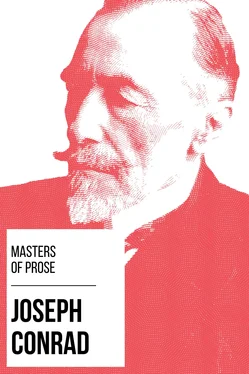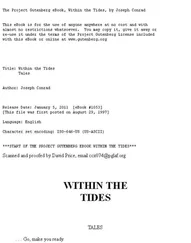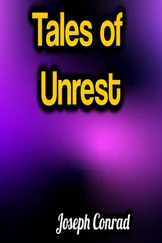Can the transports of first love be calmed, checked, turned to a cold suspicion of the future by a grave quotation from a work on political economy? I ask—is it conceivable? Is it possible? Would it be right? With my feet on the very shores of the sea and about to embrace my blue-eyed dream, what could a good-natured warning as to spoiling one's life mean to my youthful passion? It was the most unexpected and the last, too, of the many warnings I had received. It sounded to me very bizarre—and, uttered as it was in the very presence of my enchantress, like the voice of folly, the voice of ignorance. But I was not so callous or so stupid as not to recognize there also the voice of kindness. And then the vagueness of the warning—because what can be the meaning of the phrase: to spoil one's life?—arrested one's attention by its air of wise profundity. At any rate, as I have said before, the words of la belle Madame Delestang made me thoughtful for a whole evening. I tried to understand and tried in vain, not having any notion of life as an enterprise that could be mismanaged. But I left off being thoughtful shortly before midnight, at which hour, haunted by no ghosts of the past and by no visions of the future, I walked down the quay of the Vieux Port to join the pilot-boat of my friends. I knew where she would be waiting for her crew, in the little bit of a canal behind the fort at the entrance of the harbour. The deserted quays looked very white and dry in the moonlight, and as if frostbound in the sharp air of that December night. A prowler or two slunk by noiselessly; a custom-house guard, soldier-like, a sword by his side, paced close under the bowsprits of the long row of ships moored bows on opposite the long, slightly curved, continuous flat wall of the tall houses that seemed to be one immense abandoned building with innumerable windows shuttered closely. Only here and there a small, dingy cafe for sailors cast a yellow gleam on the bluish sheen of the flagstones. Passing by, one heard a deep murmur of voices inside—nothing more. How quiet everything was at the end of the quays on the last night on which I went out for a service cruise as a guest of the Marseilles pilots! Not a footstep, except my own, not a sigh, not a whispering echo of the usual revelry going on in the narrow, unspeakable lanes of the Old Town reached my ear—and suddenly, with a terrific jingling rattle of iron and glass, the omnibus of the Jolliette on its last journey swung around the corner of the dead wall which faces across the paved road the characteristic angular mass of the Fort St. Jean. Three horses trotted abreast, with the clatter of hoofs on the granite setts, and the yellow, uproarious machine jolted violently behind them, fantastic, lighted up, perfectly empty, and with the driver apparently asleep on his swaying perch above that amazing racket. I flattened myself against the wall and gasped. It was a stunning experience. Then after staggering on a few paces in the shadow of the fort, casting a darkness more intense than that of a clouded night upon the canal, I saw the tiny light of a lantern standing on the quay, and became aware of muffled figures making toward it from various directions. Pilots of the Third Company hastening to embark. Too sleepy to be talkative, they step on board in silence. But a few low grunts and an enormous yawn are heard. Somebody even ejaculates: “Ah! Coquin de sort!” and sighs wearily at his hard fate.
The patron of the Third Company (there were five companies of pilots at that time, I believe) is the brother-in-law of my friend Solary (Baptistin), a broad-shouldered, deep chested man of forty, with a keen, frank glance which always seeks your eyes.
He greets me by a low, hearty “He, l'ami. Comment va?” With his clipped mustache and massive open face, energetic and at the same time placid in expression, he is a fine specimen of the southerner of the calm type. For there is such a type in which the volatile southern passion is transmuted into solid force. He is fair, but no one could mistake him for a man of the north even by the dim gleam of the lantern standing on the quay. He is worth a dozen of your ordinary Normans or Bretons, but then, in the whole immense sweep of the Mediterranean shores, you could not find half a dozen men of his stamp.
Standing by the tiller, he pulls out his watch from under a thick jacket and bends his head over it in the light cast into the boat. Time's up. His pleasant voice commands, in a quiet undertone, “Larguez.” A suddenly projected arm snatches the lantern off the quay—and, warped along by a line at first, then with the regular tug of four heavy sweeps in the bow, the big half-decked boat full of men glides out of the black, breathless shadow of the fort. The open water of the avant-port glitters under the moon as if sown over with millions of sequins, and the long white break water shines like a thick bar of solid silver. With a quick rattle of blocks and one single silky swish, the sail is filled by a little breeze keen enough to have come straight down from the frozen moon, and the boat, after the clatter of the hauled-in sweeps, seems to stand at rest, surrounded by a mysterious whispering so faint and unearthly that it may be the rustling of the brilliant, overpowering moon rays breaking like a rain-shower upon the hard, smooth, shadowless sea.
I may well remember that last night spent with the pilots of the Third Company. I have known the spell of moonlight since, on various seas and coasts—coasts of forests, of rocks, of sand dunes—but no magic so perfect in its revelation of unsuspected character, as though one were allowed to look upon the mystic nature of material things. For hours I suppose no word was spoken in that boat. The pilots, seated in two rows facing each other, dozed, with their arms folded and their chins resting upon their breasts. They displayed a great variety of caps: cloth, wool, leather, peaks, ear-flaps, tassels, with a picturesque round beret or two pulled down over the brows; and one grandfather, with a shaved, bony face and a great beak of a nose, had a cloak with a hood which made him look in our midst like a cowled monk being carried off goodness knows where by that silent company of seamen—quiet enough to be dead.
My fingers itched for the tiller, and in due course my friend, the patron, surrendered it to me in the same spirit in which the family coachman lets a boy hold the reins on an easy bit of road.
There was a great solitude around us; the islets ahead, Monte Cristo and the Chateau daft in full light, seemed to float toward us—so steady, so imperceptible was the progress of our boat. “Keep her in the furrow of the moon,” the patron directed me, in a quiet murmur, sitting down ponderously in the stern-sheets and reaching for his pipe.
The pilot station in weather like this was only a mile or two to the westward of the islets; and presently, as we approached the spot, the boat we were going to relieve swam into our view suddenly, on her way home, cutting black and sinister into the wake of the moon under a sable wing, while to them our sail must have been a vision of white and dazzling radiance. Without altering the course a hair's breadth we slipped by each other within an oar's length. A drawling, sardonic hail came out of her. Instantly, as if by magic, our dozing pilots got on their feet in a body. An incredible babel of bantering shouts burst out, a jocular, passionate, voluble chatter, which lasted till the boats were stern to stern, theirs all bright now, and, with a shining sail to our eyes, we turned all black to their vision, and drew away from them under a sable wing. That extraordinary uproar died away almost as suddenly as it had begun; first one had enough of it and sat down, then another, then three or four together; and when all had left off with mutters and growling half-laughs the sound of hearty chuckling became audible, persistent, unnoticed. The cowled grandfather was very much entertained somewhere within his hood.
Читать дальше












